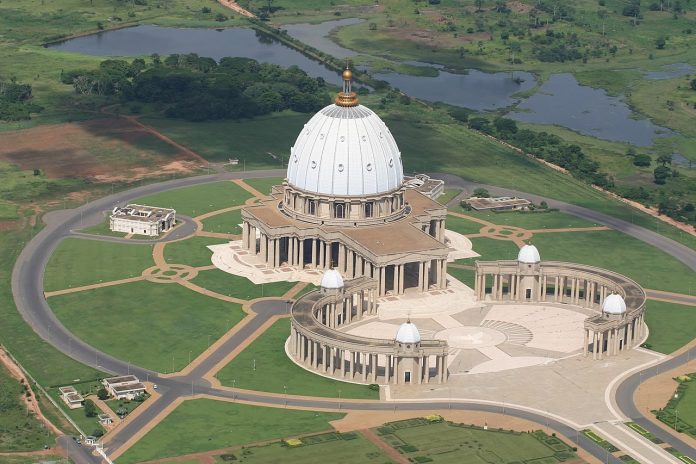On one of Yamoussoukro’s huge boulevards, three cars zigzag in all directions to get around the countless potholes. The image sums up the current state of the Ivorian administrative capital: oversized and somewhat neglected. In “Yakro” reigns the atmosphere of a ghost capital: vast avenues colonized by tall grass, rare schoolchildren strolling on giant sidewalks, immense almost empty buildings and the feeling that a modest town has come to live in a megalopolis setting.
In the middle of the Ivorian jungle. Time has stood still there, light years from the hustle and bustle of Abidjan, where, 250 km further south, ministries, embassies and large companies are gathered. For the celebration of sixty years of independence, on August 7, Abidjan is also expected to host a military parade, without any other major festivity, the Covid-19 pandemic requires. Nothing is planned for Yamoussoukro.
Far too extensive for its less than 400,000 inhabitants, this sleepy capital still retains the impressive and dusty heritage of Félix Houphouët-Boigny, father of the independence of August 1960 and native of what was still a whole small village. “Contrary to popular belief, his favorite political figure was not General de Gaulle but George Washington, who gave his life and his village to his country. He wanted to do the same”, relates Frédéric Grah Mel, author of a biography in several volumes.
Man thus dreamed of greatness for his stronghold. In the midst of the “Ivorian miracle”, a prosperous period of the economy in the 1960s and 1970s, Houphouët intended to build a modern, model and futuristic city. “He wanted to mark the Ivorian landscape with what a free African could do, breaking with the colonial capitals of Grand-Bassam, Bingerville and Abidjan”, explains Professor Jean-Noël Loucou, former director of Henri’s cabinet. Konan Bédié and Secretary General of the Félix-Houphouët-Boigny Foundation.
“Kill any inferiority complex”!
Before independence, he had already built a large house, which became the presidential palace, the official residence of the Ivorian head of state. But since his death on December 7, 1993, no Ivorian president has actually lived in this massive six-story building. The 22 km long palace enclosure is surrounded by three artificial lakes populated by sacred crocodiles. Saurians who remain untouchable despite their proliferation in the city. Here more than elsewhere, we do not contradict the “Old”.
A little further on, the Félix-Houphouët-Boigny Foundation, a research institute for peace now managed by Unesco, overlooks the district. Just like the President Hotel, an architectural colossus with old-fashioned charm. A little out of the way, it’s hard to miss the city’s most emblematic building and its greatest pride: the Notre-Dame de la Paix basilica, a monster of concrete, steel and stained glass, financed by the immense fortune of Houphouët. “The price of peace,” he argued, even though, it was said, the “Old Man” regarded state money as his own fortune.
The place, much visited, is the tallest Christian building in the world, in front of Saint Peter’s Basilica in Rome. No coincidence, according to Father Franck Allatin, rector of the basilica: “I think that President Houphouët wanted to kill any inferiority complex in the hearts of Ivorians, to tell us that we are capable of achieving great things, on condition of working hard and loving our land.”
While the city evolved considerably during his presidency (1960-1993), everything came to an abrupt end after his death. Those whom he considered his “political sons” had the difficult task of continuing his work. But neither Henri Konan Bédié in the 1990s, nor Alassane Ouattara in the 2010s took up the torch. “I regret not having been able to transfer the capital to Yamoussoukro as I had promised” despite the “important work” done in recent years, even conceded the president at the end of 2019 in front of an audience of Baoulé chiefs, the ethnic group of ‘Houphouët.
Faced with this community with a certain political weight, Ouattara was undoubtedly making amends for his decree in 2012 to abolish the special program for the transfer of the institutions of the Republic initiated by Laurent Gbagbo.
Yet a fierce opponent of Houphouët-Boigny and his single party, the former Ivorian president is the only one to be really involved in continuing the work. “The calculation was political, but not only. He told himself that there had been so much investment that we had to see it through. Gbagbo is a historian, he wanted to leave a mark,” said Jean-Noël Loucou.
Symbolic milestones!
While the vast majority of institutions are still based in Abidjan, symbolic milestones have been established over the past two years. Alassane Ouattara thus installed the Chamber of kings and traditional leaders in a villa, and the Senate in the offices of the Foundation in April 2019. “Nobody wants to kill the father a second time since his death and give up the project”, estimates Professor Loucou.
The zone intended for the embassies is thus already found… but none of them have taken place yet. Ditto for the ministries, still well established in Abidjan. “It’s dragging its feet. No one is really up for going to live in Yamoussoukro,” said a political observer who prefers to remain anonymous.
Economically, “the sleeping city”, as Mr. Grah Mel describes it, suffers from unemployment and a lack of attractiveness. Industries and plantations are struggling to support Yakro and its district. In this area too, the capital is promised better days.
For example with the industrial zone project, this area of 750 hectares intended to accommodate companies in the agri-food sector and supposed to make Yamoussoukro “the epicenter of the industrialization of the interior of the country”, as claimed in 2018 Souleymane Diarrasouba, the Ivorian Minister of Trade and Industry.
Long neglected but never completely abandoned, Houphouët’s great project still has supporters. Especially among those who consider it urgent to open up Abidjan, the Ivorian economic capital, overpopulated and in perpetual development. “Abidjan is suffocating”, summarizes Frédéric Grah Mel. Yet sixty years after independence, Yamoussoukro still seems far from being able to offer him a real breath of fresh air.

